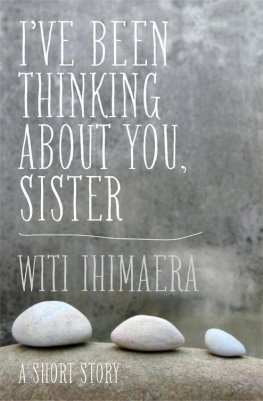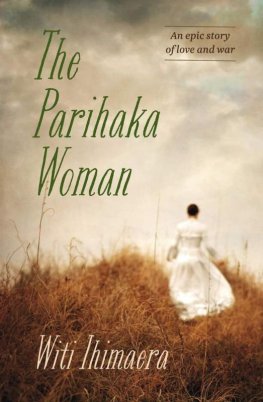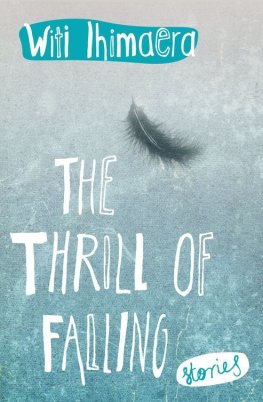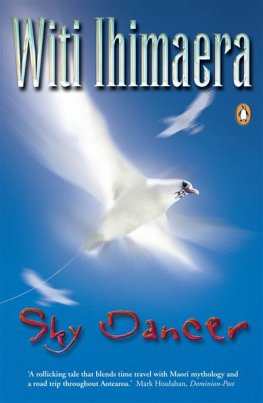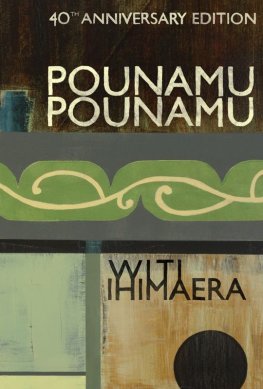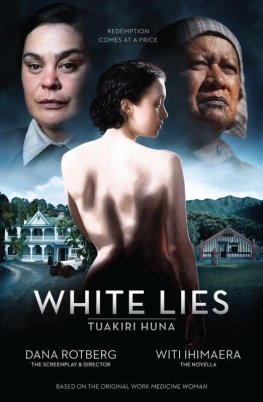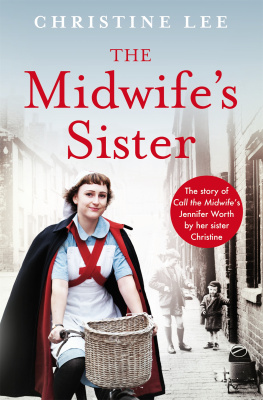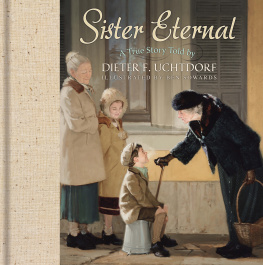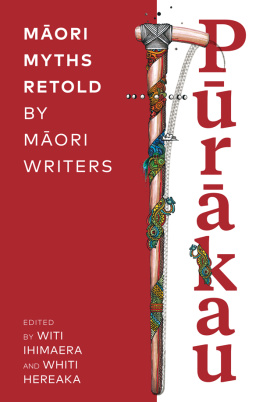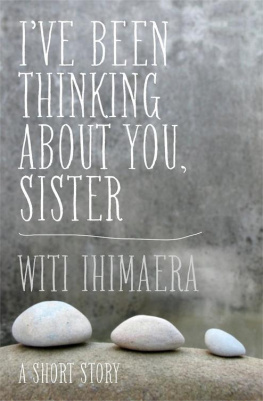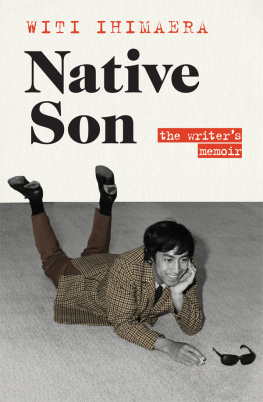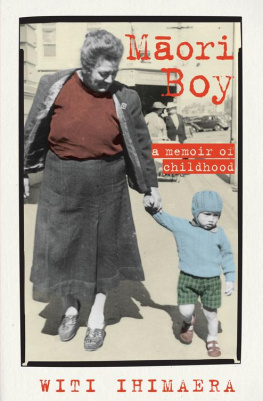Ive Been Thinking About You, Sister
A Short Story
Witi Ihimaera
Brian rang yesterday to ask if I would send him a short story for an anthology he was planning to publish. The trouble was he wanted the kind of story I used to write thirty years ago.
It should be easy for you, he began. People love your comic stories about hockey games or sentimental ones about old ladies playing cards, not to mention the epic tales of girls who ride whales to save their iwi.
Brian, I answered, I was just a young man when I wrote those stories and the world was a different place. Im not that same person any more, not as innocent and my voice is not as lyrical. Nor is my work so essentialist any longer; its more synthesised. And Im a professor of English, into postcolonial discourse, Freire, Derrida and The Empire Writes Back.
I was afraid youd say something like that, Brian sighed, but he was not about to give up. Maybe youve got a story that you put in a bottom drawer years ago, something you wrote before you became, well, political? Something like the story you wrote about the wily Maori tohunga who puts a spell on a red-headed Irish woman? Readers just love that one! Can you take a look? And if you cant find a story, can you try to write one for me of the kind you wrote when you were younger? And keep politics out of it? Not that theres anything wrong with the stories you write now, he added hastily, but theyre, well, a bit more difficult for the gentle reader. You dont mind my saying that, do you?
Irritated, I put the telephone down. I had worked so hard to become an indigenous writer of some critical distinction, somebody whom critics could admire for my polish and fearlessness in articulating the indigenous position. I had established myself as a writer who was not afraid to engage the complexities of race, identity and representation and examine the polarities that existed between majority and minority cultures. Despite this, while I now garnered hard-earned accolades from critics, the people who actually bought my books were always telling me that my earlier stories and novels were better. Some reviewers, when I started rewriting the earlier work, scolded me. Ah well, tutae happens.
Two days later, however, I began the following story, which happened to my mother in 1989. Being a fiction writer, I have altered some of the details and names of those involved in the story.
* * *
My mother was looking out the kitchen window of the house at Haig Street, Gisborne, when she saw her brother Rangiora sitting in the sunlight on the back lawn. She was baking scones for a kindergarten bring and buy and had just taken the last batch from the oven; she almost dropped them.
Mum was seventy at the time and although her impulse was to rush out the door and give Uncle Rangiora a hug, instead she first went to the bathroom to splash water on her face, run a comb through her hair and put some lipstick on. The bathroom window looked over the back lawn, so Mum was able to check that he was still there he was. He was in his army uniform, wearing his khaki cap, and he didnt look a day older than when he had left for the war. She looked at her own reflection in the bathroom mirror. In comparison, with her grey hair and her dull skin, she looked so old. She was overwhelmed with self-pity and embarrassment.
Smoothing out her dress, Mum walked out the back door and toward Uncle Rangiora. As she approached, he stood up, took off his cap and smiled at her it didnt seem to matter at all that he was still so young and she was so old.
Hello, brother, she said to him. Why have you come to see me?
His eyes were twinkling as he gave a deep, grave bow. Ive been thinking about you, sister, he said. Its a long time since we had a waltz.
He opened his arms in invitation and, with a laugh of pure joy, she stepped into them.
When I grow too old to dream,
Ill have you to remember,
When I grow too old to dream,
Your love will stay in my heart
After the waltz, Uncle Rangiora bowed again and left my mother standing alone in the sunlight. As he did so, a brown bird flew past her, heading after him, and she watched it as it sped across the sky.
* * *
My father didnt know about Uncle Rangioras visit until he returned from Waituhi; he had been shifting cattle from the hill paddock to the flat in preparation for the trucks that would come the next morning to take them to the saleyards. When he arrived home he found my mother speaking on the telephone. There was something different about her, something radiant.
When Mum hung up, Dad asked her, Who have you been talking to?
Ive been making enquiries, she answered. First of all I rang the Returned Servicemens Association and then the army at Waiouru and the Maori Battalion Association in Wellington. I wanted to know when they were making their next visit to the Commonwealth war graves in Egypt and the Middle East.
What for? Dad asked, puzzled. He could tell that Mum had a bee in her bonnet about something.
I want to visit Rangioras grave, Mum answered. The Battalion arent going until next year though, so it looks like you and I will have to make the trip by ourselves. Ive just asked the travel agent to book our trip for us. He wants us to go into town to see him and to have our photos taken for our passports.
My father was seventy-seven, and he was waiting to have a replacement hip operation. He didnt think Mum was serious but when she said, Were going and thats that, he tried stonewalling. I better have my operation first, he said.
Once Mum has made up her mind about something, however, nothing can stop her. Shes always been strong-willed and even though she loves my dad there are moments when, if he gets in her way, hed better watch out. In that case, she said, Wikitoria can come with me, referring to one of my sisters, and you can stay home.
* * *
My mother wanted to go to Tunisia because Uncle Rangiora had been killed there on 26 March 1943, at Point 201, Tebaga Gap. He had been a member of C Company, part of the platoon led by Second Lieutenant Ngarimu as they tried to take the German-held position. Twenty-two Battalion soldiers, including Ngarimu and Uncle Rangiora, were killed that day.
Not only was Mum strong-willed but, when she made up her mind, she moved really fast. Once shed had her discussion with Dad she rang Wikitoria and told her to meet her at the travel agents the next morning. Satisfied that she was getting somewhere, she went to have a shower and prepare for bed. While she was in the shower, Dad rang me up in Wellington to try to get me to talk some sense into her.
Shes much too old to go travelling to the other side of the world, Dad said. And how is Wikitoria going to get somebody to look after her fish and chip shop? Hoha, your mother, hoha.
I knew that there was no way of stopping Mum. Once she had the bit between her teeth she was off and away. Uncle Rangiora had been her favourite brother. He was just two years older than her and, while they were growing up, he looked out for her; he loved taking her to swim down at the local river and together they would dive for beautiful white river stones. Even when he was a young man and had girlfriends, he and Mum were still as close as ever. Whenever church dances were held at Tokomaru Bay, Uncle Rangiora always saved the last waltz for her. There was a photograph of Mum and Uncle Rangiora taken just before he went to war Mum always had it on her dressing table. In the photo, Uncle Rangiora was a handsome, laughing, cavalier boy; my mother was a slip of a girl in a pretty white dress, holding him as if she never wanted to let him go.
When Uncle Rangiora was killed, Mum was inconsolable. However, life goes on and, after the war ended, she moved to Gisborne to stay with her sister, Mattie, and worked as a shedhand in various shearing gangs. Dad was a shearer thats how they met. But she never forgot Uncle Rangiora, who had been buried in the Commonwealth war cemetery at Sfax, Tunisia. For as long as I can remember, every year without fail, Mum has walked in to

